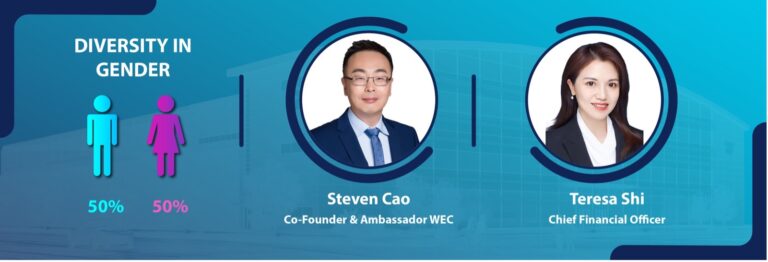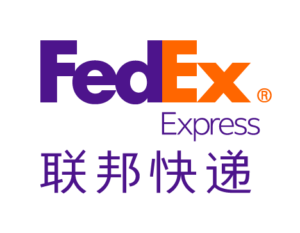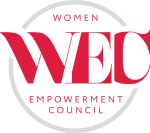2022 Q1 Newsletter
Five Pillars of DEI
The WEC quarterly newsletter explores the latest thought leadership on women empowerment and DEI, showcases the significant efforts and progress made by our committed Members, and highlights special announcements and updates about the council.
Thought Leadership
Explore the latest learnings on women empowerment and diversity, equity, and inclusion.
Inspired by insights from the 2021 DEI Global Conference organized by The Conference Board, WEC highlights five key factors that can make DEI successful in your organization for consideration in Q1 2022.
1) Language Matters: Begin by Defining
According to Angie Peacock, Global Director, D&I at PDT Global in order to hold people accountable we must be clear on the terminology.
- Diversity is all about the numbers. Expand the areas of diversity you address and measure them in your workforce.
- Equity is a verb. Equity is the activity around ensuring that every individual has an equal opportunity for advancement. Measure the equity activity.
- Inclusion is the result of equitable practices. Inclusion is creating an environment where everyone with the capability to excel can flourish. Measure inclusion by how employees are feeling and break that down by groups within your diversity areas.
2) Culture Matters: Consistency is Key
According to Joanna Kim Brunetti, VP of Regulatory Affairs at Trusaic it is increasingly evident that organizations expect managers to demonstrate real action and progress in DEI.
- 65% of organizations consider DEI a high strategic priority.
- Only 1 in 3 are very successful in creating a diverse, equitable, and inclusive workplace.
- Keys to success: Commitment from leadership and commitment to data.
- Conclusion: Executives must establish a baseline and set goals, monitor DEI metrics regularly, use data to manage efforts, and communicate progress. Sharing trends shows employees that DEI matters and the organization’s commitment is ongoing.
“You’ve got to run DEI like a business function, not an HR program…when the CEO sets the strategy and frequently communicates progress, the company is 6.3 times more likely to have a diverse leadership team and is also more likely to be a leader in its industry segment.” – Kathi Enderes, vice president of Research at The Josh Bersin Company
3) Leadership Matters: Impact Trumps Intention
According to Dr. Rachel Cubas-Wilkinson, Principal Organizational Development Consultant at Myers-Briggs 93% of leaders agree that DEI is a top priority but only 34% believe it is a strength in their organization. This indicates a significant gap between intention and results.
- Impact is 70% effected by direct managers.
- 1 in 3 leaders believe they are more inclusive than perceived by others.
- Employees’ perception of their manager is their day-to-day reality.
- Organizations must develop all leaders not just the C-suite.
- Focus on developing competencies and behaviors that move the needle: empathy, openness, courage, curiosity, flexibility, and humility.
- Shift from intention to impact by closing the self-awareness, skills, and confidence gap.
4) Data Matters: Information to Insight to Influence
According to Ester Neznanova, Senior Director, DEI at T-Mobile the main role of a DEI Leader is to empower leadership to make strategic decisions based on real-time data. To achieve this desired outcome, the data needs to tell a story. The premise of that story is to imagine:
“You are building and selling not one, but two products. One is the actual product or service that you provide to your customers, the other is your culture, where your employees are your customers.”
- Step 1 – Know Your Customer (Employee): Understand your employees, identify their pain points, learn how they experience the culture day-to-day, segment the data into diversity areas, use this information to create personas that represent different employee groups.
- Step 2 – Get a Holistic Lifecycle View: Identify leaks in your pipeline by following the full employee acquisition journey, from attracting talent to interviewing, onboarding, training, retaining, promoting, and exiting.
- Step 3 – Focus and Commit: Once you know your employees, map their journeys, and identify the leaks, then you can focus resources where it counts and commit to making systemic change that positively impacts and includes all groups in your culture.
- Step 4 – Never Stop Evolving: Creating a culture that employees believe in and advocate for takes ongoing effort and experimentation, especially as you continue to incorporate new and diverse perspectives in your team.
5) Principles Matter: Beyond Best Practices
According to Rohini Anand, author of Leading Global Diversity, Equity, and Inclusion, best practices and strategies are not enough, principles are what matter. Five proven principles provide a guide to MNCs for leading global DEI transformation in divergent cultures:
- Make it Local: Raise issues in a local context and empower local change agents.
- Leaders Change to Lead Change: When leaders lead with authentic passion, organizations move towards sustainable progress.
- And it’s Good Business, too: DEI enhances innovation, ability to recruit and retain top talent, employee engagement, financial performance, and more.
- Go Deep, Wide & Inside-Out: Embed DEI within all systems, processes, and structures.
- Know What Matters & Count it: Metrics are instruments for change and people must be made accountable.
Member Spotlight
Learn about the significant efforts and progress made by our passionate and committed WEC Members to empower women and drive diversity, equity, and inclusion in their organizations or the wider community.

Chayora.com develops hyperscale, world-class designed and operated, data centre campuses in China. Datacentres are the essential “homes” for digital information. Billions of people in the world need to access datacentres, 24-7-365, on any digital device. We are in business to serve global Fortune 500 companies and premium Chinese data centre operators.
Our first operational datacentre campus is strategically located in Northern China’s Beijing/Tianjin/Hebei Tri-state Region. Our Tianjin tri-state site covers 80 acres and will have 9 data centres on full completion. Chayora has also announced the launch of our second 10,000 rack data centre campus serving Shanghai. These two data centres when fully developed will jointly provide capacity of more than 200MW of IT load and over 35,000 racks for customers.
In December 2021 EdgeConneX®, the pioneer in global Hyperlocal to Hyperscale Datacentres Solutions, announced that it has made a strategic investment in Chayora. The partnership with Chayora provides EdgeConneX with data centre offerings in Beijing and Shanghai, two of the largest markets in China, along with the ability to scale out Chayora’s platform to other major markets throughout mainland China. The EdgeConneX global footprint spanning 50 markets across four continents, combined with Chayora’s data centre offerings in China, provides a worldwide platform for data centre customers requiring either hyperlocal edge capacity that is highly proximate to their end users or hyperscale capacity built to suit customers’ unique specifications.
DIVERSITY IN GENDER AND CULTURE
Extraordinarily multicultural, with sales and operations across the globe, Chayora is gender parity equal – we currently employ 50% male and 50% female staff. Chayora co-founder Steven Cao and EVP Customer Relations Karen Kesner are WEC Co-Representatives.


THE CHALLENGES ACROSS THE GLOBE
According to Grant Thornton’s Women in Business Report 2021, the number of women holding senior leadership positions, (mostly in midmarket businesses), has only reached 31%. This is only up 2% from previous years, despite the global pandemic.
In the Technology sector this gap is also too wide. A career in computing, technology, and IT, has previously been seen as more of a ‘male’ career path. Companies in the tech sector globally, are all trying actively to improve the gender gap, with events such as “Balance in the Boardroom”.
In China, women still face the same challenges developing their chosen career path. China only ranks 106 out of 153 countries in the World Economic Forum’s Global Gender Gap Index 2020. At entry level, women make up about 50% of the workforce. But in terms of advancement to senior positions, this proportion decreases significantly.
Nowadays, Chinese companies are reaching great success and have become major international names. Many were born in the Internet era with strong technical capabilities. However only 9.4% of board members of Chinese public companies are women, compared with the global average of 33%.
Elsewhere in the world, Corporate Boards in Western countries are still heavily dominated by men. Only in recent years many companies have added more women in response to pressure from investors, regulators and consumers. Now, all of the companies in the Standard & Poor’s 500 Index have at least one female director. Currently female directors make up 28.8% of board seats.
In California, mandate has been established to require most publicly traded local companies to have at least three female directors by the end of 2021, according to Bloomberg.
In Singapore, President Halimah Yacob, the country’s first female head of state created a government diversity council. This body has set targets to achieve 25% female board representation by 2025, and 30% by 2030.
CHAYORA’S PERSPECTIVE
Unlike many corporate organizations, Chayora, doesn’t work to ‘quotas’ to drive up gender parity. We currently support a 50 – 50 male/female ratio. Our company benefits from highly skilled and experienced business leaders, and we believe in appointing the right person for the job and selection based on experience, commitment and ability with no distinction drawn on gender. This approach naturally encourages the most flexible approach to diversity.
We at Chayora fully acknowledge and value the contribution to our business from our entire team. We have attracted a brilliantly talented group of individuals. We all share a joint passion for growing Chayora into a successful business; whoever they are and wherever in the world they may be located!
We want to be known as a company that people want to work for. That means offering interesting roles, supporting career ambitions, and enabling personal growth. We believe we should reward people for their achievements irrespective of their gender or culture. This means remaining neutral on matters of achievement and being supportive where personal circumstances require it.
Chayora is showing its commitment to WEC by having appointed two co-representatives, Karen Kesner and Steven Cao. Karen said, “I am committed to working with my co-members in WEC toward continued awareness and impact in 2022 and leading our passion in recruiting additional WEC members.”
For more information on Chayora visit www.chayora.com

Diversity, Equity, and Inclusion has been a cornerstone at FedEx for nearly 50 Years. FedEx is committed to empowering diverse voices and providing access to leadership, education, and employment opportunities that inspire people to succeed.
FedEx Strengthens Gender Diversity Commitment with Endorsement of United Nations Women’s Empowerment Principles
Kawal Preet, President of FedEx Express, Asia Pacific, Middle East and Africa (AMEA) region, has signed the CEO statement of support for the Women’s Empowerment Principles (WEPs) – Equality Means Business.
Established by the United Nations Entity for Gender Equality and the Empowerment of Women and the United Nations Global Compact, the WEPs are a set of seven actions that companies choose to adopt to advance gender equality and empower women in the workplace and community.
Preet endorsed the statement of support in the presence of regional leadership and team members in Hong Kong.
With People-Service-Profit philosophy at the heart of the company, FedEx is a strong supporter of gender equality both inside and outside of the organization, and was named one of the Best Workplaces in Asia TM for 2021 by Great Place to Work®.
Diversity starts at the top.
The FedEx Board of Directors includes 12 directors, four of whom are women. Women represent 25% of FedEx management employees globally.
Each FedEx operating company maintains a dedicated team to support DEI across the company. Representatives from each operating company also participate in our enterprise-wide DEI Corporate Council, where they share best practices and support multicultural programs in the communities we serve. The Council works to increase business performance, innovation, and employee engagement by fostering a culture of DEI across the enterprise.
In 2020, FedEx Express created a Global DEI Governing Board to oversee DEI efforts throughout the FedEx Express operating company. This Board also supports our U.S. and international regional diversity councils, which work to address local DEI issues in support of the global strategy. FedEx Services and FedEx Corporation also maintain a DEI Executive Steering Committee to develop DEI strategy, oversee DEI efforts, and drive engagement. At FedEx Ground, a cross-functional group of officers and directors make up the Inclusion Leadership Council in order to set and drive strategic and tactical DEI efforts.
Progress Report
Catch up on any WEC activities you’ve missed this quarter and stay up to date on important announcements.
Women Empowerment Awards in China Nomination Form to Launch February 7th
Individual Awards
Outstanding Woman Leader of the Year
Male Ally of the Year
Innovative Young Woman Leader of the Year
Company Awards
Best Company for the Advancement of Women (MNC)
Best Company for the Advancement of Women (SME)
Best Policies and Benefits to Promote Gender Equity
The WEC initiated the awards to recognize trailblazing individuals and innovative companies that have demonstrated a robust commitment to promoting women in the workforce in order to encourage greater gender equality and drive stronger business outcomes.
We strongly encourage our WEC community members to nominate themselves, their companies, and any other individuals or companies they admire. Stay tuned for more information about the judges, process, award criteria, and nomination tips.

Girls in STEMM Officially Launched in Beijing and Shanghai
The WEC created the Girls In STEMM program to address the gender gap and leaky pipeline in STEMM fields early on. Girls In STEMM provides high school students with the opportunity to visit WEC member companies, hear from women leaders about their professional journeys in STEMM, and see what pursuing a STEMM career looks like in the real world of work.
The WEC is proud to continue the Girls in STEMM Program in Beijing, working with Canadian International School of Beijing, Dulwich College Beijing, International School of Beijing, and Keystone Academy Beijing. This year the program has also expanded to Shanghai with Concordia International School Shanghai and Yew Chung International School Shanghai (Puxi and Pudong Campuses) participating.
To kick things off, students attended orientation sessions where they networked with girls from other participating schools, reflected on their goals for the program, and spoke with our President and Founder, Su Cheng Harris-Simpson. ExxonMobil in Beijing hosted the first company visit of 2022 and all 40 students had the chance to interact with 13 women leaders from various science and engineering roles through hands-on workshops and presentations. Coming up, students will be visiting ConocoPhillips, HPE, CocaCola, Henkel, Dell, and Merck.
Upcoming Events
Shanghai – Feb 22nd
Invited guests: WEC member representatives, senior executives, and leaders in a position to shape and influence policies.
Purpose: Forum for decision-makers to network in an intimate setting, exchange ideas, learn from thought-leaders, and influence each other on trending topics related to DEI.
Topic: Increase Inclusivity with Flexible, Smart Workspace
Description: Offering employees flexibility is one vital way to increase inclusivity. Flexible work arrangements, a silver lining of the pandemic, has proven beneficial to both employers and employees. Workplace flexibility attracts top talent, improves employee engagement and retention, enhances diversity and inclusion, increases productivity and creativity, and reduces cost and carbon footprint. Exchange ideas on the tools and practices to foster the ideal work environment for employees.
Online – March TBD
Target audience: Entry to senior level employees of WEC member and non-member companies, especially women, HR professionals, leaders and decision-makers.
Purpose: To broaden reach for best practice sharing, showcase Members as thought leaders, and amplify WEC messages.
Topic: Move Beyond Work-Life Balance
Description: We all struggle to manage work and life. This is especially challenging for mothers who face the “double burden” of balancing employment with disproportionate domestic responsibilities. So, what’s the solution? Over 72% of employees say that flexible work arrangements and smart work environments make them happier and more productive! Learn best practices from innovative companies making flexibility and inclusion a priority in order to support individual needs and empower everyone to thrive.
Beijing – March 3rd
Quarterly Executive Meetings engage all WEC member representatives to discuss and shape the direction of the council and reflect on current gender equality needs.

Want to Stay Updated?
Subscribe here to get the latest WEC Thought Leadership, Member Highlights, and Progress Report straight to your inbox.